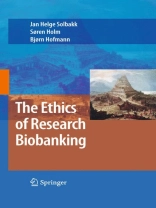Biobanking, i.e. storage of biological samples or data emerging from such samples for diagnostic, therapeutic or research purposes, has been going on for decades. However, it is only since the mid 1990s that these activities have become the subject of considerable public attention, concern and debate. This shift in climate is due to several factors. The purpose of this book is to investigate some of the ethical, legal and social challenges raised by research biobanking in its different modern forms and formats. The issues raised by research biobanking in its modern form can be divided into four main clusters: how biological materials are entered into the bank; research biobanks as institutions; under what conditions researchers can access materials in the bank, and problems concerning ownership of biological materials and of intellectual property arising from such materials; and how the information is collected and stored, e.g. access-rights, disclosure, confidentiality, data security and data protection.
表中的内容
Research Biobanking: The Traditional Approach.- Consent to Biobank Research: One Size Fits All?.- What No One Knows Cannot Hurt You: The Limits of Informed Consent in the Emerging World of Biobanking.- Users and Uses of the Biopolitics of Consent: A Study of DNA Banks.- Information Rights on the Edge of Ignorance.- The Dubious Uniqueness of Genetic Information.- Duties and Rights of Biobank Participants: Principled Autonomy, Consent, Voluntariness and Privacy.- Biobanking and Disclosure of Research Results: Addressing the Tension Between Professional Boundaries and Moral Intuition.- Biobanks and Our Common Good.- Trust, Distrust and Co-production: The Relationship Between Research Biobanks and Donors.- Scientific Citizenship, Benefit, and Protection in Population-Based Research.- Research Biobanking: Towards a New Conceptual Approach.- Mapping the Language of Research Biobanking: An Analogical Approach.- The Use of Analogical Reasoning in Umbilical Cord Blood Biobanking.- The Alexandria Plan: Creating Libraries for Human Tissue Research and Therapeutic Use.- The Art of Biocollections.- The Health Dugnad: Biobank Participation as the Solidary Pursuit of the Common Good.- Embodied Gifting: Reflections on the Role of Information in Biobank Recruitment.- Conscription to Biobank Research?.- Ownership Rights in Research Biobanks: Do We Need a New Kind of ‘Biological Property’?.- Legal Challenges and Strategies in the Regulation of Research Biobanking.- Annexation of Life: The Biopolitics of Industrial Biology.- In the Ruins of Babel: Should Biobank Regulations be Harmonized?.












